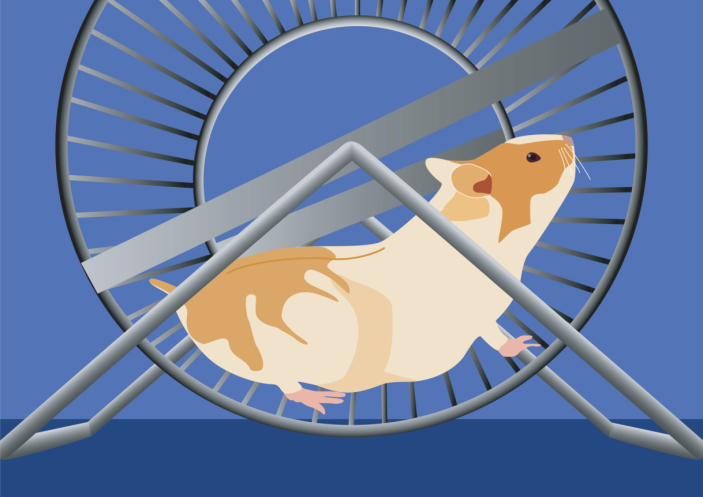
Step away from the hamster wheel advises Liz Stincelli
Time management is an oxymoron. Time is beyond our control, and the clock keeps ticking regardless of how we lead our lives. Priority management is the answer to maximizing the time we have
John C. Maxwell
I hear over and over again comments along the lines of, “Day in and day out, the hamster wheel turns, and I have gotten nowhere.” I feel this way myself at times and I sit and wonder why I feel so overwhelmed. I sympathize with the frustration, the feeling that there is never enough time in the day.
So many factors play into us becoming overwhelmed: the distractions, the interruptions, the meetings, and constantly changing priorities. And, it never seems to get easier; the more valuable you become, the more demands are made on your time.
If you want to get off the hamster wheel:
- First, come to terms and get comfortable with the fact that it is not possible to complete your entire to-do list every day.
- Second, develop the following healthy habits that will help you manage your priories.
Start out on the right foot
Develop the habit of getting into the office early to get the day started on the right foot. Try to get into the office at least one hour before anyone else. This hour is often the only peace you will have all day and you might get more done in that short period than the whole rest of the day. Getting in early can be more productive than working late because after the day has turned to chaos, you end up exhausted with your mind going in 100 different directions. First thing in the morning things are calm and you can think straight.
Must-dos
The next habit is identifying the must-dos on your to-do list. Now, everyone says that everything on their to-do list is a must-do. But, what are the absolute must-dos for tomorrow? Keep a running to-do list so that nothing slips through the cracks, but each night, before you leave the office, identify the three must-dos for the next day. A list any longer than three will overwhelm you and will be unrealistic to complete. With a list longer than three, you end your day feeling like you have failed. Get real about your must-dos, get in early, and get them tackled.
Set boundaries
The habit of setting boundaries is imperative if you want to stop feeling so overwhelmed. Get in the habit if setting aside time in 90-minute blocks to focus on your must-dos. Sometimes it is difficult to focus, undisturbed, for 90 minutes but if you learn to really set some boundaries and stick to them you can do it and it will make a world of difference. Whether it’s a closed door or a do not disturb sign, get people to understand that you are unavailable during this 90 minutes every day and that you will catch up with them as soon as you can.
Meetings are another opportunity to set boundaries. They are our biggest time-wasters. While the demand of meetings on your time might not be 100% in your control, do whatever you can to minimize the number of meetings you must attend and help them to run as efficiently as possible. You have to teach people that you will not drop everything for a last-minute meeting unless it is a significant matter.
Batch Tasks
In our always-connected world, distractions and interruptions are priority management killers. We waste so much time bouncing back and forth between emails, voicemails, social media, and the task at hand. Develop the habit of batching tasks such as checking voicemail and emails: sit down for 20 minutes and go through them and then don’t check again until you can sit for another 20 minutes. Getting distracted by email or phone calls for a minute here and a minute there quickly eats away at your day.
Delegate
As we take on more and more responsibilities, it becomes important to develop the habit of delegation. Look at your team; find a bright, energetic, ambitious team member who you can engage, mentor, and delegate tasks to. This not only helps clear your plate, it’s a great opportunity for your team members to be challenged and gain experience that will benefit them in the future. Just make sure you don’t delegate so much to one person that they become overwhelmed themselves.
Communicate
And then there is the habit of communication. First, you must get a clear understanding of what your priorities should be from your manager’s point-of-view. You must also clearly communicate the priorities to your team members. You must communicate regularly with your manager, keeping them in the loop. Let them know what you are working on and which team members are working on which projects. Communication becomes even more important if you feel that it is not possible to meet all of the demands that are being placed on you.
Conquer the Overwhelm
Last, but most important, take care of yourself! You cannot give 100% if you are working 13-14 hours, seven days a week. You have to draw the line somewhere. You will be much more effective in the time you are working if you have time to rest, recover, and restore. Take a few deep breaths, develop some healthy priority management habits, set some boundaries, make time to take care of yourself, and conquer the overwhelm.












